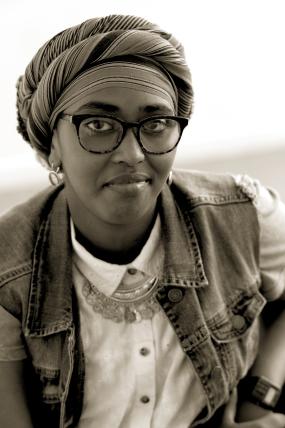Hamda Yusuf is a UW junior pursuing a major in International Studies and minors in German and African Studies. Hailing from Somalia, a country known as a "nation of poets", she began writing poetry as a means to better connect to the ancient traditions of her ancestors. Hamda's poetry has been featured at both TEDxRainier and The Paramount Theatre. She hopes to become the US Ambassador to Somalia someday.
Why did you decide to study German?
I usually tell people it’s because I was awful in French class, which is really only partially true. Coming to UW I knew I didn’t want to just study a language: I wanted to become fluent in it. I took three years of Mandarin Chinese in high school but I didn’t want to continue it, so I decided to try German. My first German class ended up being really great and by the end of it I already felt comfortable enough to carry on a conversation. German 101 is still the most fun class I’ve ever taken at UW. I had a really great teacher and she encouraged me to continue studying German.
You are focused on International Studies. Has your knowledge of German and the German culture been relevant to your chosen field?
Absolutely! Just this fall quarter I was taking a European culture and politics class and many of our topics overlapped with my German 301 class. I’d spend an hour discussing the ramifications of the Fall of the Berlin Wall on the East Germans in my Jackson School course, then I’d go and discuss the very same topic, except this time in German. It gave me a whole new perspective on my major and it assured me that I’m learning the right language for what I’m studying.
You are planning on attending graduate school and are interested in joining the Foreign Service. How will German play a role in helping you achieve your goals?
I’m hoping that my German language skills will set me apart from other applicants in the Foreign Service. Even though French and Spanish are languages that are more widely spoken in the world, there aren’t as many German speakers, which makes it a great language to learn. I’ve got a strange mix of languages, Somali and German, but I’m expecting that to help me in my goals of working abroad and bridging cultures.
You are a slam poetry champion here in Seattle, performing for Youth Speaks. There is a thriving slam poetry scene in Berlin as well. You haven't begun to write poems in German yet, but if you were to do slam poetry in German, is there a topic from your German classes at UW that you would choose as the basis for a poem?
Definitely. In my last German class we discussed protests, particularly those of young German students in the 60’s, and I couldn’t help but connect those protests with the ones my friends and I were going to in support of Mike Brown and Eric Garner. One of the short stories that we read tackled police brutality against protesters, and it was this very same short story that I was thinking about when I saw some of my friends pepper sprayed by the police at a demonstration. I’ve been thinking about that story quite often and how so many of our narratives are intertwined without us even knowing it. I think it would make for a great poem; I suppose I’d just have to get around to writing it.
Do you have a favorite German poem or poet?
My favorite German poet has got to be May Ayim. Her poetry collection Blues in Schwarz Weiss was some of the first German poetry I’d ever read. She was half German half Ghanaian and she never shied away from tackling the two distinct cultures in her life. Her poems Afro Deutsch I and Deutschland Im Herbst are my favorites. She often spoke about her identity and feeling like she wasn’t German enough for some people and not African enough for others. There is so much passion and fierceness in her poetry that I really admire. She was completely unapologetic not only with her poetry but in her life as well. Not many of her poems are translated so it’s a nice challenge for me to read them in their original German.
You are very committed to fostering understanding and connections between different cultures. For you personally, what role does knowledge of a foreign language play in achieving this?
I think learning a foreign language really exposes you to a whole different side of a country. You see the cultures and traditions in a much different light. When I moved to the US from Somalia when I was 10, I took English as a Second Language classes, but I really learned English sitting in front of the TV learning about American culture. Languages have always played a huge role in my life and I expect that German won’t be the last language I learn.
